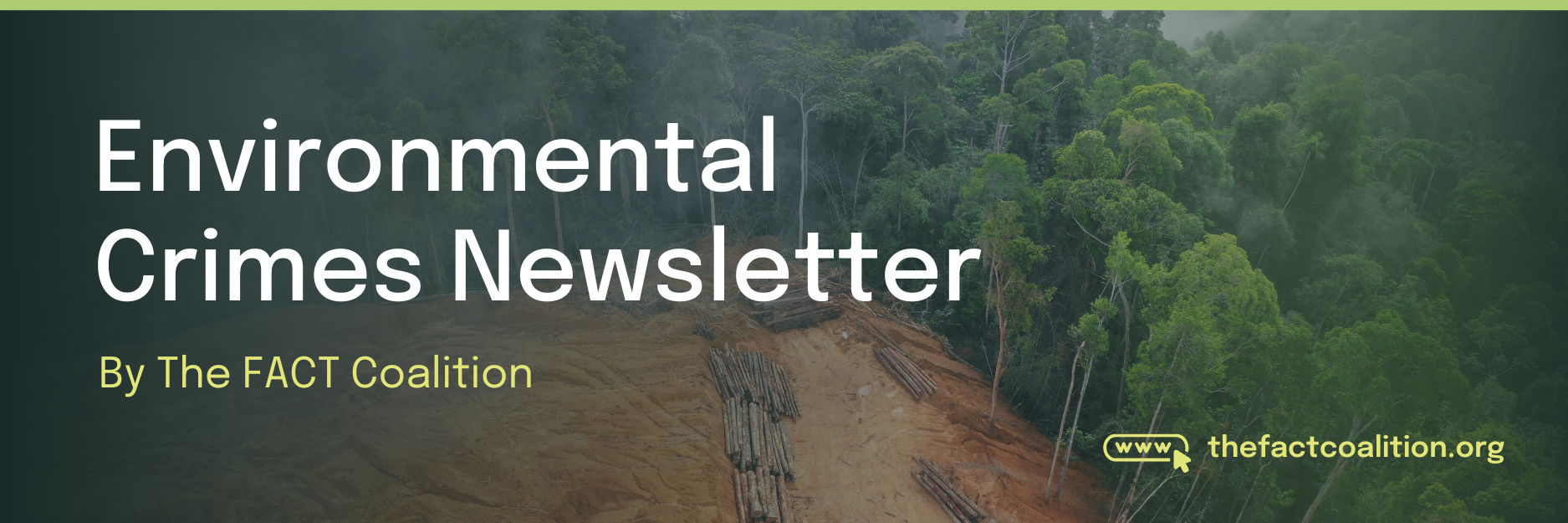FACT is pleased to share a round-up of news and information regarding efforts to combat environmental crimes and the dirty money associated with them. The newsletter, which is published on a biannual basis in September and June, highlights efforts by FACT as well as perspectives from our members and allies. Send feedback or items for our upcoming Spring 2025 newsletter to Julia Yansura at jyansura@thefactcoalition.org.
Mid-Year Highlights from FACT’s Work on Environmental Crime & Illicit Finance
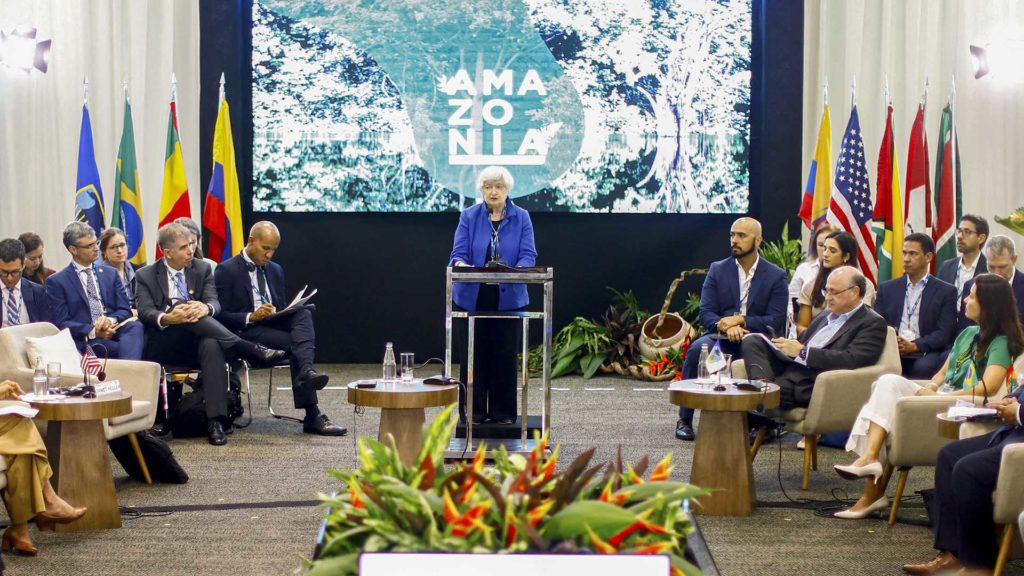
The Amazon Region Initiative Against Illicit Finance
FACT welcomed Treasury Secretary Janet Yellen’s launch of the Amazon Region Initiative Against Illicit Finance in July 2024. The initiative will target the proceeds of nature crimes such as illegal logging and mining through increased collaboration, information exchange, and technical assistance with countries in the Amazon region including Brazil, Colombia, Ecuador, Guyana, Peru, and Suriname.
Treasury’s announcement comes less than a year after FACT launched its agenda-setting report, Dirty Money and the Destruction of the Amazon, calling on the U.S. to step up efforts to address the dirty money associated with environmental crimes.
“When it comes to environmental crimes in the Amazon, the U.S. is a destination country for both illegally sourced products and the dirty money associated with them,” said Julia Yansura, FACT program director for illicit finance and environmental crime, in a press release. “It’s time for the U.S. to change this dynamic, and the Amazon Region Initiative is a major step in the right direction.”
Meanwhile, analysts from the Igarapé Institute, a leading Brazilian think tank and a partner of FACT, noted that “one of the reasons the US is stepping up efforts to disrupt illicit financial flows related to nature crime in the Amazon is precisely because of the increasing involvement of transnational organized crime” in this illicit economy.
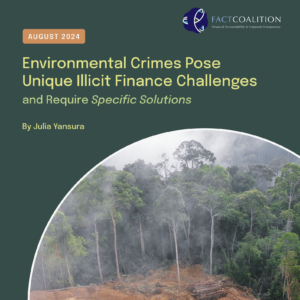
New FACT Policy Brief on Environmental Crimes
In August 2024, FACT published a new policy brief titled Environmental Crimes Pose Unique Illicit Finance Challenges and Require Specific Solutions. The brief argues that applying generic anti money laundering and counter terrorism financing approaches without tailoring them to the specific realities of environmental crime is unlikely to be fully effective. It outlines ways in which environmental crimes differ from other predicate offenses.
Environmental crimes often involve “double laundering” in which illegally sourced commodities are laundered (for example, making illegally sourced timber appear to be of legal origin by falsifying documents or bribing officials) and then the financial proceeds are subsequently laundered (for example, making dirty money appear to be legitimate earnings).
As a result of this double laundering, illicit finance cases involving environmental crime are complex and time consuming. It’s important to recognize this and to ensure that investigators and prosecutors have the tools, resources and training necessary to effectively take on these cases.
Like much of the work that FACT does, the policy brief is the result of close collaboration with coalition members and allies. Conversations with the UNCAC Coalition helped to inspire this analysis, and feedback from the Wildlife Justice Commission and the International Wildlife Trust helped to strengthen the policy brief.
From Our Partners and Allies
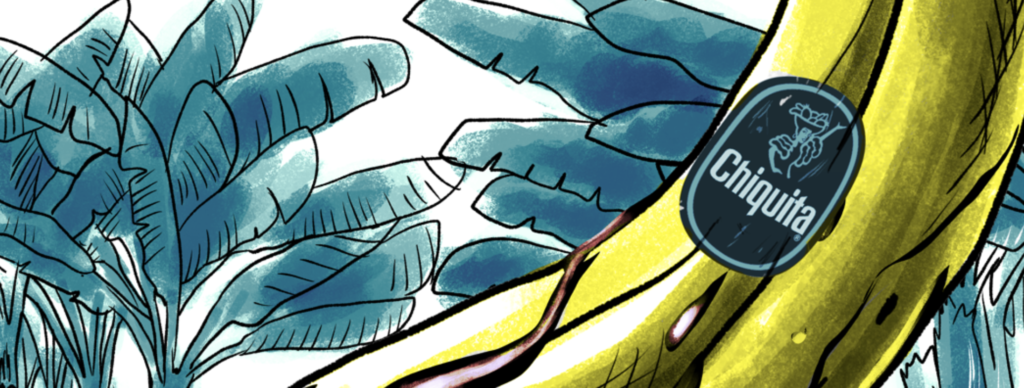
Chiquita Found Liable for Funding Colombian Paramilitary Group
In June 2024, a Florida jury found Chiquita Brands International liable for financing the United Self-Defense Forces of Colombia (AUC), a paramilitary group and formerly-designated foreign terrorist organization.
“By providing over $1.7 million in illegal funding to the AUC from 1997 to 2004, Chiquita contributed to untold suffering and loss in the Colombian regions of Urabá and Magdalena, including the brutal murders of innocent civilians,” noted EarthRights International, which provided legal representation for some of the victims.
EarthRights further noted that this “marks the first time that an American jury has held a major U.S. corporation liable for complicity in serious human rights abuses in another country, a milestone for justice.”
As Marissa Vahlsing, Director of Transnational Legal Strategy with EarthRights International, explained to FACT, “this case shows that corporations, no matter where they are in the world, must respect the rights of the communities where they operate or be held to account in their home court. Our brave and determined plaintiffs understood this, and now the rest of the world does as well.”
EarthRights International, a FACT Coalition member, is a non-governmental, non-profit organization that combines the power of law with the power of people in defense of human rights and the environment, which they define as “earth rights.” They take legal action against perpetrators of earth rights abuses, train activists, and work with communities to demand meaningful and lasting change.
Gold and International Responsibility
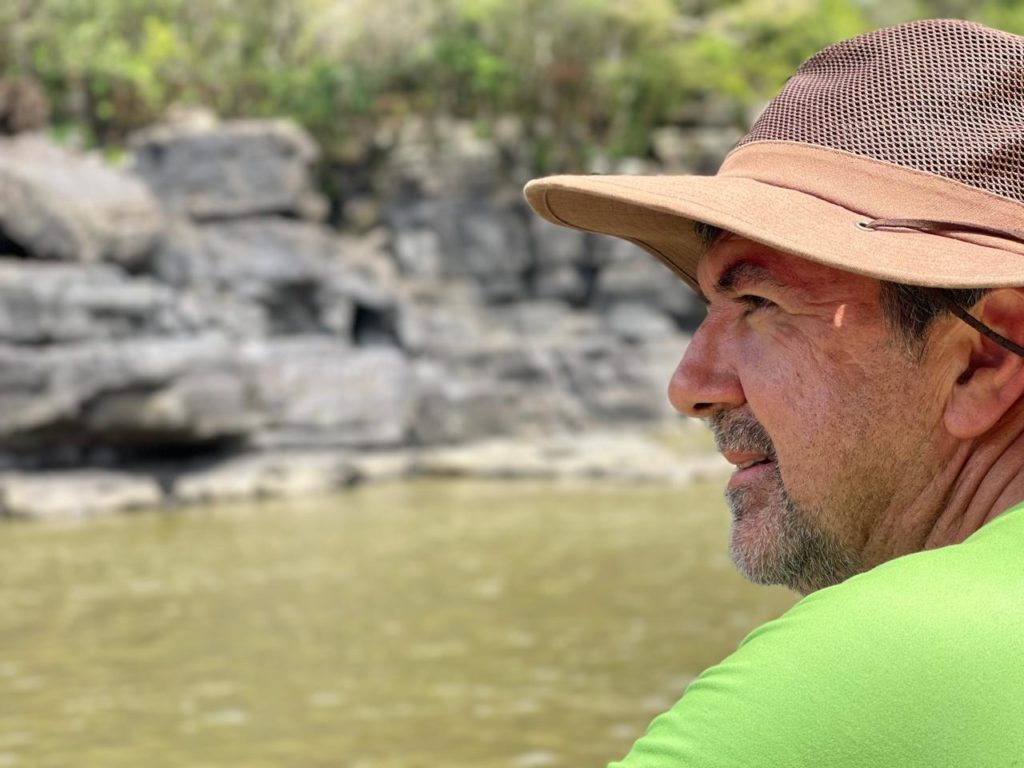
In June 2024, Rodrigo Botero, Director of the Fundación para la Conservación y el Desarrollo Sostenible (FCDS) published a not-to-be-missed opinion piece titled Gold and International Responsibility.
“There is no serious effort by the countries and companies that buy gold, domestically or internationally,” Botero writes in the article. “Nothing seems to have worked – not traceability efforts, certifications of origin, legislation on money laundering, nor highlighting linkages with other serious crimes such as drug trafficking, promotion of slavery and sexual exploitation – to generate a framework that incentivizes formal production and closes the enormous loopholes for illegal production. The result is the ever-increasing environmental, social, economic and political impact of the illegal gold market.”
“Amidst smiles, photos and statements, the countries that purchase gold promote a project here or there related to environmental or social sustainability, restoration, technological improvement, or association between small and large miners. But, fundamentally, there is no control over the gold (…)”
Speaking to FACT in August 2024, Botero explained why he wrote the piece. He noted that, “currently, the illegal gold trade is fueling one of the strongest processes of loss of governance, biodiversity, and forests in the history of the Amazon.”
Botero wants readers in the U.S. to understand that “this is not a subnational or local issue.”
“Rather, it involves more than six Amazon countries, with contiguous borders, which are configuring the largest space in Latin America for environmental, social and cultural crimes, in addition to the financing of numerous armed groups that erode the fragile regional democracy,” Botero told FACT.
Botero also told FACT that “the absence of traceability mechanisms (creating a market where the “clean” origin of gold is guaranteed) allows the creation of illegal armies, subjugation of local populations, corruption of public officials, laundering of illegal money through the purchase of land and cattle ranching, as well as links to narcotics proceeds. All this generates a tremendously powerful and unstoppable illegal economy in protected areas and local communities.”
FCDS, a FACT coalition ally, is a leading environmental non-governmental organization based in Colombia and Peru. FCDS is dedicated to the sustainable and equitable development of human communities, mainly rural, in harmony with the conservation of nature and the social characteristics of the territories.
New Documentary Highlights the Realities of Deforestation in Peru
A new documentary film by Peruvian investigative journalist Daniel Yovera titled “Cotuhé: The Forgotten Frontier” provides insights into environmental crimes occurring along the Cotuhé river in the Peruvian Amazon, one of the richest biodiversity corridors in the world. The film, which was produced by Epicentro TV in partnership with Proética, the Peruvian chapter of Transparency International, and with the support of the Earth Journalism Network, is available on Youtube in Spanish.
As Daniel Yovera explained to FACT, Cotuhé is Peru’s largest conservation concession at 224,000 hectares. He notes that the area is “remote and almost inaccessible.”
Yovera explains that, “for almost fifteen years, the owner of the concession had abandoned the place, due to the inaction of the national authorities. This facilitated the penetration of illegal mining and drug trafficking mafias during that time. According to information from Colombia, dissident groups of the Revolutionary Armed Forces (FARC) have formed alliances with Brazilian criminal organizations to control drug and illegal gold routes, with the Cotuhé River serving as one of their axes.”
Events
HSI Wildlife and Environmental Crimes Summit
On September 5, 2024, FACT participated in the Homeland Security Investigations (HSI) Wildlife and Environmental Crimes Summit in Washington, DC. In a panel discussion with representatives from HSI, the US State Department, the Spanish Guardia Civil, and the US Department of Justice, FACT Executive Director Ian Gary highlighted the importance of beneficial ownership information in combating environmental crimes.
COP16 Side Event: Minería de Oro en la Amazonía
On October 23, 2024, FACT alongside allies Observatorio de la Minería Ilegal (chaired by FCDS-Peru), the Alianza amazónica para la reducción de los impactos de la minería de oro (chaired by Frankfurt Zoological Society of Colombia), and the Igarapé Institute, will participate in a COP16 side event titled Minería de Oro en la Amazonía.
We hope to see some of you in Cali!
Featured Press Coverage
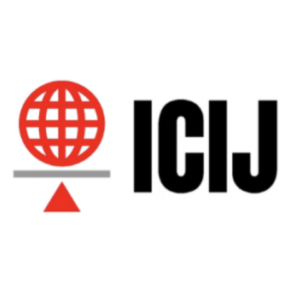
New US Treasury plan targets criminal groups profiting from the destruction of the Amazon
FACT program director for illicit finance and environmental crime Julia Yansura was quoted in coverage of the new Amazon Initiative by ICIJ’s Brenda Medina.
“These crimes are transnational, and therefore require transnational cooperation to investigate and prosecute,” said Yansura. “To truly curb natural crime, law enforcement must follow the money that fuels environmental destruction. We hope the U.S. plays a constructive role in that effort.”

Dipteryx Project: The Algorithm That Alerts High Risks of Illegality of Amazonian Timber
FACT partners, including the Environmental Investigation Agency (EIA) and Proética, the Peruvian chapter of Transparency International, were featured in a recent OjoPúblico report on the Dipteryx Project, which uses a new algorithm to measure illegal timber risks from open-source commercialization data.
Opportunities

The Environmental Investigation Agency (EIA) is hiring an Africa Program Lead for Forest Campaigns. More information can be found here.
From the listing: “EIA-US is seeking an experienced and highly motivated program manager to lead our forest campaigns in Africa and bring them to a new level. The Africa Program Lead will be responsible for the development and implementation of EIA’s cutting-edge strategies in Africa. On par with campaign responsibilities, the Africa Program Lead will lead the Africa Program Team and spearhead our media and communication strategy in the different priority areas of West, Central, and East Africa.”

